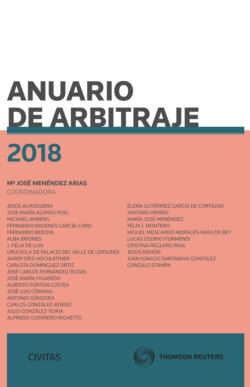Читать книгу Anuario de arbitraje 2018 - Mª José Menéndez Arias - Страница 12
На сайте Литреса книга снята с продажи.
2. DISCOVERY
ОглавлениеAre there any three words more terrifying to civil-law practitioners than «discovery» and «fishing expeditions41)»? It would seem not based on how frequently they are raised in the literature on Americanization of arbitration42). But international arbitration practitioners need not live in fear. The «fishing expedition» characterization of discovery is an exaggeration that ignores the existence of American procedural rules designed to prevent discovery abuses43).
Moreover, fishing expeditions are less likely to occur in the types of disputes that are submitted to international arbitration. When a dispute arises under a contract containing an arbitration clause, it is likely the parties already exchanged a great deal of the information that will be relevant to interpreting that contract and resolving the dispute when they were negotiating it, so the need to go on a fishing expedition is greatly reduced in international arbitration. What’s more, it is not as if civil-law regimes do not also recognize the necessity of requiring a party in possession of relevant evidence to turn that evidence over to the other party44). Of course, even if civil-law systems recognize a right to evidence, there are major differences in practice between civil-law jurisdictions and the US in how readily requests for production of documents are accepted by courts and in how specific such requests must be45). But the point is that the notion of the tribunal requiring one party to produce documents in its possession that the other party needs to prove its case is foreign to no one.
Finally, and most relevantly, current best practices in international arbitration do not follow US-style discovery rules. American discovery is a party-driven process that is merely overseen by a judge, not necessarily directed by one. For example, under Rule 26 of the Federal Rules of Civil Procedure, the parties have a duty to provide initial disclosures and to confer and attempt in good faith to agree on a discovery plan before the court holds a scheduling conference. There is no parallel duty imposed under most rules of international arbitration, and the IBA Rules on the Taking of Evidence in International Arbitration (IBA Rules) clearly envision a document-production process involving close participation and oversight by the arbitral tribunal46).
Furthermore, most of the means of discovery provided in the Federal Rules of Civil Procedure are not commonly used in international arbitration. The Federal Rules offer the following tools: requests for production of documents (Rule 34), depositions (Rules 27, 30-32), interrogatories (Rule 33), requests for admission (Rule 36), and even physical and mental examinations (Rule 35). Of those, only requests for production of documents are used with any frequency in international arbitration. The lack of interrogatories, requests for admission47) and depositions48) shows international arbitration is not barreling toward full-on Americanization. Indeed, even the rules for the international arm of the American Arbitration Association expressly state that «Depositions, interrogatories, and requests to admit as developed in American court procedures generally are not appropriate procedures for obtaining information in an arbitration under these Rules49)». Likewise, the IBA commentary on the IBA Rules on the Taking of Evidence in International Arbitration states that «[e]xpansive American –or English– style discovery is generally inappropriate in international arbitration50)».
However, it must be noted that any international arbitration that involves a party, or even a third party, with a sufficient connection to the United States from whom evidence is sought, could involve parallel proceedings under 28 U.S.C. § 1782 which might make available the discovery methods of the Federal Rules of Civil Procedure. 28 U.S.C. § 1782 provides that a US federal district court can order a person who resides in that district to give evidence «for use in a proceeding in a foreign or international tribunal». If the court order does not specify a foreign procedure to be followed, the Federal Rules of Civil Procedure apply51). After language quoted in a US Supreme Court decision indicated support for the notion that an arbitral tribunal could be considered a «tribunal» under the law52), US federal courts are divided on that issue. Some continue to follow the decisions of the two federal appellate courts that dealt with the precise question of arbitral tribunals in cases that predate the Supreme Court’s decision, and which held that arbitral tribunals are not «tribunals» under § 1782, while others have chosen to follow the quoted language from the Intel decision to hold that they are53). Thus, if an arbitration involves a party or third party from whom evidence is sought and who resides in a part of the United States where the courts follow the dicta from the Intel decision, unless and until the US Supreme Court definitively declares that arbitral tribunals do not qualify as «tribunals» under § 1782, there is a possibility of US-discovery elements being injected into the arbitration in the form of a parallel proceeding.
As mentioned in section IV, the massive increase in the number of digitally created documents knows no borders. The great challenge today in both civil-law and common-law regimes is figuring out how to cope with rapidly changing technologies efficiently but also fairly and consistently. The search-for-truth nature of US litigation has undoubtedly caused these problems to be felt more acutely in the US than they are in civil-law jurisdictions. But, on the other hand, in civil-law systems, where contemporaneous written evidence is generally placed at the zenith of the evidentiary hierarchy54), why make it less likely parties will be required to turn evidence over to the other side with stricter requirements on document requests?
There may be no generally applicable solution for dealing with the deluge of documents from either the common- or civil-law tradition, but if arbitrators can anticipate the facts required to carry each party’s burden of proof and keep the parties focused on those facts, the mountains of documents can be surmounted55).
